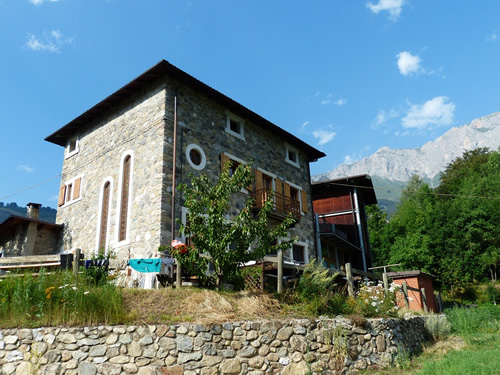Homestay Organizations for Budget Travelers Abroad
Lay Down Your Head but Not a Lot of Cash
By Tim Leffel

|
|
A homestay in Italy.
|
When Australian Steve Savage set out on his around-the-world journey he was traveling alone but wanted to meet lots of people. And he didn’t have nearly enough money. So he signed up with some homestay programs.
Now he is spending most nights in the homes of total strangers — including mine. When Steve came to Nashville we had a nice dinner together and talked for hours about travel, politics, and the oddities of the U.S. and Australia. His
new hosts picked him up the next day and he spent a week at their farm, earning a little cash for helping out with odd jobs.
Meeting Locals and Immersion in Local Culture Through Homestays
Homestay programs are a great way to meet locals on your trip, people who aren’t trying to sell you something or be your paid guide. It can be an enriching experience for both parties and can save the traveler
a significant sum of money, especially in countries where lodging is expensive. It gives you a chance to see how the locals live and to get an insider’s perspective on the area. The people you stay with often know the best local
bargains, the most worthwhile things to see and do, and the easiest way to get from point A to point B. In places with limited public transportation (such as most of the U.S.), your hosts will often pick you up from the train station,
bus station, or airport.
Homestay programs are built upon the idea of give and take. When you’re a traveler, you stay with others; when you’re stationary, you volunteer to be a host. If you live in Manhattan or San Francisco you’ll
probably get lots of requests. If you live in an area that’s not a tourist attraction, you’ll get very few. There are ground rules about how long people can stay and information on sleeping arrangements. Some people may have
a guest house; others may have an air mattress on the living room floor. These details are generally available up front.
As a traveler, you contact hosts in advance of when you plan to visit and request accommodations around a specific time period. The host accepts or denies the request (or says, “Contact me again when it’s
closer”); then you exchange more details and contact information. Some hosts will bend over backward to feed you and show you around town if you want; others may not have the time to provide more than a bed and a shower.
Benefits of Homestay Programs for Travelers
The oldest and largest organization is Servas, which aims to facilitate cultural exchange rather than a mere bed exchange. The organization has 15,000 hosts in 100 countries. You pay a membership fee to join and you
are interviewed by another member before you are accepted. Then you can order host lists for the areas you intend to visit. Servas says these lists are not available on line “and never will be.” Travelers present a letter of
introduction upon arrival. My wife and I were Servas members during a trip through Europe in the mid-90s and stayed with several people in Holland. We had many interesting conversations, and one host loaned us bicycles to go exploring
for a day.
Couchsurfing has boomed into a massive community of members who can visit over 200,000 cities abroad, while offering their own home to those visiting from abroad. The community is extensive and highly interactive..
Individual countries often offer organized homestay programs that allow you to stay with local families. These are sometimes commercial arrangements that help families subsidize their meager salaries and are especially
common in former Soviet states, including Eastern Europe. In other countries the fee just covers costs for food and transportation. Several states in India, for example, have official lists of families willing to host travelers. The fee
is often similar to that of the cheapest budget lodgings. But the experience is much more enriching, and you’ll often get to sample local specialties that are a far cry from what you find in restaurants. A good guidebook usually
lists places to go for information on these programs. It’s worth checking with local tourism offices even if you don’t see anything listed.
If you decide to take advantage of these kinds of programs your hosts won’t be expecting much in return, but it’s always a good idea to either bring an inexpensive gift (such as flowers or fruit) or offer
to help out around the house. Offering to wash the dinner dishes or watch the children for a while will be appreciated, even if they don’t take you up on it. Be a good ambassador and the system will continue to work well for everyone.
Resources for Cheap Homestays Abroad
Servas. Travelers must be interviewed and approved to become members, with a small fee required to access 15,000 hosts in 100 countries.
Homestay.com lists 63,000 rooms in over 176 countries of inspiring and unique options.
International Homestay Agency is a provider of cultural exchange experiences for international students and host families.
|
Tim Leffel is author of several books, including A Better Life for Half the Price: How to prosper on less money in the cheapest places to live. See more on his Cheapest Destinations Blog.
|
